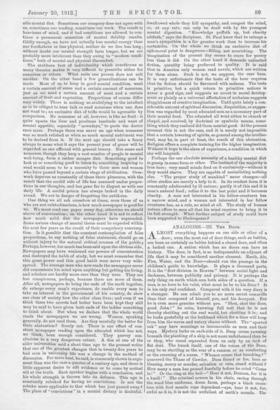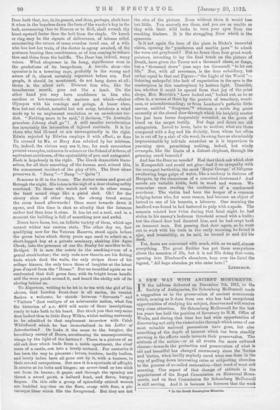A NALOGIES. — III. GIE S.— III. Tan Dom. A LMOST everything happens on
one side or other of a door; even the most out of door things, such as battles, are born as certainly as babies behind a closed door, and often a locked one. A. nation which has no doors can have no history. The door, in fact, is so indispensable an adjunct of life that it may be considered another element. Earth, Air, Fire, Water, and the Door—should run the passage in the children's guide to knowledge. It plays a thousand parts, It is the "first division in Heaven" between social light and darkness, between publicity and privacy. It is perhaps the only thing on earth which sees both sides of a question. If a man is no hero to his valet, what must he be to his Door ? It is his only real confidant. Compared with it his very diary is a stranger. He can admit you to no more secret cam arilla than that composed of himself, you, and his doorpost. But he is even more genuine without you. " Shut., shut the door, good John !" lie cries, knowing full well that he is not thereby shutting out the real world, but shutting it in; and he looks gratefully at the bulkhead which for a time will keep from him the waves and watery shams without. The " sported oak" may have meanings as innumerable as men and their ways. Mystery lurks on each side of it. Deep ocean yawning beneath the planking of a ship is not more unfathomed than he or they, who stand separated from us only by an inch of fiat deal. The knock itself, one of the voices of the Door, may be as startling as the roar of a cannon or as comforting as the crooning of a nurse. " Whence comes that knocking ?" quavered the Thane of Cawdor. Does friend or foe, bore or blessing, mercy or murder, salvation or ruin, stand without ? How many a man has paused fearfully before he cried "Come in!" Or the ring at the bell—" Hear it not, Duncan, for it is a knell l " The criminal cowers in his chair, seeing through the wood blue uniforms, doom faces, perhaps a black cross. tree with foul manila rope dependent —aye, hear it not, for, awful as it is, it is not the awfullest of earth's sounds. The
Door bath that, too, in its gamut, and thou, perhaps, shalt bear it when in the hopeless dawn the turn of the warder's key in the lock, summoning thee to Heaven or to Hell, shall wrench thy heart upward faster than the bolt from the staple. Or knock or ring may be the signals of deliverance, of intense relief.
announcing the return of some overdue loved one, of a wife who has lost her train, of the doctor in agony awaited, of the postman bearing thee remittances, or of him coming to release thee and thine from the bailiffs. The Door has, indeed, many voices. What eloquence in its bang, significance even in the gradations of its bangedness. A terrific slam—the operator is in a towering rage, probably in the wrong and aware of it, almost certainly repentant before eve. Bad people, it should be mentioned, do not bang doors at all; theirs is the silent exit. Distrust him who, like the treacherous month, goes out like a lamb. On the other hand you may have confidence in him who, careless or hot-tempered—it matters not which—shakes Olympus with his comings and goings. A lesser slam, firm but not violent, noiseful but not noisy, betokens a wind made up to an unpleasant resolution or an unwelcome ver- dict. "Nothing more to be said," it declares, "To Australia graceless Johnny shall go " ! A still smaller reverberation has invariably the intonation of injured rectitude. It is for those who feel ill-used or are unrecognizedly in the right. Edwin rejected by Edwina employs it with effect ; so does Pa crossed by Ma, or Mary Ann rebuked by her mistress. Or, indeed, the victors may use it, too; for such encounters present examples, unknown to science or the School of Athens, of equivalent antitheses, of the equivalidity of pro- and antagonist. Each is hopelessly in the right. The Greek dramatists them- selves, for all their searching of the human soul, missed this, the commonest incident of the play of life. The Door alone preserves it. " Bang "—" Bang "—" Quits "!
Someone is ill in the house. The doctor comes and goes all through the night. His token is the sigh of a door closing softly overhead. To those who watch and wait in other rooms the faint sound rings like a pistol shot. Oh 1 for the cheery slam of other days, the strong tread across the room heard afterwards Once more towards dawn it opens, and this time is shut so silently that the listeners rather feel than hear it close. It has let out a soul, and in a moment the building is full of something new and awful.
Doors have faces, too, an infinite variety of them, which age cannot wither nor custom stale. The other day we, fast qualifying now for the Veteran Reserve, stood again before the green baize which thirty years ago used to admit us, a short-legged boy at a private seminary, shaking like Ague Cheek, into the presence of our Dr. Busby for sacrifice to St. Bridget. It is now the entree to the smoking-room of a genial stockbroker; the only rods now therein are his fishing tools which deck the walls, the only stripes those of his college blazers, the only tears those of laughter at the latest jeux &esprit from the " House." But we trembled again as we confronted that dull green face, with its bright brass handle and the worn patch around it, and heard the clothy sob of its closing behind us.
To Algernon, waiting to be let in to tea with the girl of his choice, that London front-door is all smiles, its varnish flashes a welcome, he stands between " Servants " and " Visitors " (last vestiges of an aristocratic nation, what fun the historian of Aso. 4000 will make of these inscriptions) ready to take both to his heart. But think you that very same door looked thus to little Davy Wilkie, whilst waiting nervously to be admitted to that unpleasant interview with Caleb Whitefoord which he has immortalized in his Letter of Introduction P Or looks it the same to the burglar, the hereditary enemy of Doors, scrutinizing its uncompromising visage by the light of the lanteru P There is a picture of an old oak door which leads from a noble apartment, the chief room of a castle, out into a lovely orchard. For centuries it Las been the way to pleasure : lovers, hunters, lordly loafers, and lovely ladies have all gone out by it, with a benison, to their several occupations. But now it is a spectacle of affright. It strains at its bolts and hinges ; an arrow-head or two stick out from its beams ; it gapes. and through the opening are thrust a sword point, a halberd head, and fierce, hungry fingers. On this side a group of splendidly attired women are huddled tog'•ther on the floor, crazy with fear, a pic- turesque litter which fills the foreground. But they are not the don of the picture. Even without them it would lose but little. You scarcely see them, and you are as unable as they with their wild looks to turn your eyes from the cracking timbers. It is the struggling Door which is the cynosure.
Is it not again the hero of the piece in Blake's immortal vision, opening its " ponderous and marble jaws " to admit the worn• out greybeard P But no fewer than four great word- painters, intending to lay the final touch on the picture of Death, have given the Terror not a thousand claws, or fangs, but a "thousand doors" (one says ten thousand) "to let out life." Nor, with all reverence, is the door subsidiary, but rather equal to that sad Figure—" the Light of the World "— listening unhopeful (the lack of expectation in the eyes is the masterpiece in this masterpiece) by lantern light. Consider, too, whether it could be spared from that joy of the print shops, Mrs. Merritt's " Love locked out," locked out, as he so often is, a manse et thoro by the postern of treachery, weari- ness, or misunderstanding; or from Landseer's pathetic little canvas, entitled " Suspense,"* whereon a noble dog gazes earnestly at the closed door through which his knightly master has just been borne desperately wounded, as the gouts of blood on the carpet testify. But dogs and doors are old antagonists. Loved to lover, babe to mother, what are these compared with a dog and his divinity, from whom too often he is cut off by a slab of vile wood, its smug face as abominably impressionable by tell-tale scratches as it is impervious to yearning eyes, permitting nothing, indeed, but windy errumphs, like the blasts of a distant elephant, through the grinning crank beneath P
And has the Door no moods P Had that thick oak which shut in Kempenfelt and would not give—bad it no sympathy with the outraged battleship, the most ' Royal George,' of 100 guns swallowing huge gulps of water, like a cockney in distress off Margate, by the clumsiness of a conceited lieutenant P And moods are variable kittle, both in wood and women. We remember once reading the confession of a condemned murderer. The victim had been the keeper of a common lodging-house who, for some reason, had become an object of hatred to one of his tenants, a labourer. One morning the landlord was found in bed battered to pulp with a spade. The assassin related how twice during that fatal night he had stolen to his enemy's bedroom threshold armed with a knife ; but the closed door had daunted him, and lie had crept back an innocent man. But passing that door again, as he went out to work with his tools in the early morning, he found it ajar, and irresistibly, so he said, he turned in and did his deed.
Yes, doors are concerned with much, with, as we said, almost everything. The great Builder has put them everywhere about the mansion of life, but it is not His doing that some, opening into Bluebeard's chambers, bear over the lintel the legend, " All hope abandon ye who enter here I" LINESMAN.











































 Previous page
Previous page